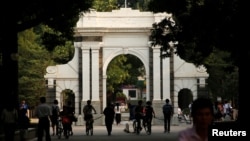Support is growing at home and abroad for a liberal law professor at China’s Tsinghua University who was recently suspended for criticizing Chinese President Xi Jinping.
But how big an impact the backlash will have on the university’s Communist Party-appointed leadership or in China’s academic circles remains to be seen, observers say. Xu Zhangrun is one of several dozen cases of academics recently silenced because of their dissenting views.
Two weeks ago, Tsinghua University launched an investigation into Xu after he wrote articles that boldly criticized the Communist Party’s repressive policies in recent years including last year’s constitutional amendments to scrap Xi’s two-term limits.
Not intimidated
So far Xu has been silent about the investigation but has shown no signs of caving to the university’s suppression, according to Hu Jia, a rights activist in Beijing.
“He [Xu] came to the realization that, in times of crisis, so many people have taken his side and spoken up for him. This shows that justice naturally inhabits man’s heart,” Hu quoted Xu as saying after having exchanged messages with the professor on the Chinese social media app Wechat.
“It is Professor Xu’s belief that history will be on his side and justice will prevail. And no matter how hard those in power suppress him, the truth cannot be hidden,” Hu added.
Seven professors from the U.S. Australia and France have initiated an online campaign in support of Xu that is addressed to the university’s president Qiu Yong.
Andrew Nathan of Columbia University in New York is leading the campaign, which has already collected dozens of signatures. The campaign is open until next Friday, after which, it will be sent to the university and the names of the signatories will be made public.
International petition
In the letter, academics have called on Tsinghua “to restore Professor Xu’s normal status…. including his teaching and research duties and to refrain from any further sanctions against him,” adding that the incident has damaged the university’s academic reputation.
Professor Nathan said Qiu should resign if he can’t protect Tsinghua from political interference.
“Political interference destroys the quality of academic work,” he said in an emailed response to VOA.
Tsinghua has yet to comment publicly on Xu’s case or the investigation. VOA could not reach Qiu for comment.
Nathan said that Xu’s case is one of around 40 such cases currently in China where academics have been suspended or fired. Xu’s case has attracted the most attention because he’s a distinguished scholar whose writing is so eloquent. It also could be that “foreign scholars’ sense of alarm has increased,” he adds.
Another initial signatory, Perry Link from University of California at Riverside, noted that “a university that prevents a professor from telling the truth as he sees it is a university that falls far below international standards.”
Growing support
And support for Xu and calls for his reinstatement are not just coming from overseas. An earlier call in China has so far garnered more than 700 signatures, nearly 300 of which were from faculty and students at Tsinghua, including Xu’s colleagues Lao Dongyan and Gao Hongjun.
Despite the Communist Party’s heavy-handed approach, the level of support for Xu is unprecedentedly high, said Zhang Ming, a retired professor of political science from Renmin University of China.
Before Xu, academics including Tang Yu of Chongqing Normal University, Yang Shaozheng of Quizhou Normal University and You Shengdong of Xiamen University's Tan Kah Kee College were removed from their jobs after “informant” students allegedly reported on the professors’ “politically incorrect” comments.
But Zhang doubts that Qiu will cater to growing pressure and reinstate Xu as he has no final say.
“University [presidents] in China, including those at Tsinghua and Peking University, are mostly appointed [by the Communist Party]. So, he [Qiu] has served a government official, who only takes orders from [the party’s] higher-ups,” Zhang said.
“There’s no such thing as the autonomy of the university in China. So, it will come down to how his [Qiu’s] superiors respond to [the growing pressure],” he added.
Dial up protest
Hu Jia, the activist, urged more to speak up and send a message to Xi – a Tsinghua alumnus. Hu said Xi is attempting to create a "red terror" by intimidating the country’s political liberals.
“The voices uttered by international society haven’t been loud enough. We need to dial up the volume so that the Communist Party understands that academic freedom is so ironclad that any dictator, who tries to break it, shall bleed,” Hu said.
“We can no longer tolerate [the party’s] rampant suppression of scholars in an arbitrary and reckless manner,” the activist added.
Hu urged Tsinghua’s 20,000 students and its alumni at home and abroad to join the fight.
He also called on international education institutions, science journals or bar associations to take Cornell University’s earlier example and reevaluate their cooperation with Tsinghua.
Cornell, in November, suspended two exchange programs with Renmin University in Beijing after the school punished at least a dozen students who joined a nationwide call to protect rights of low-income workers in China.




